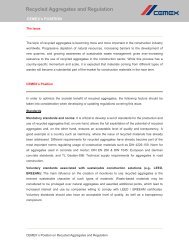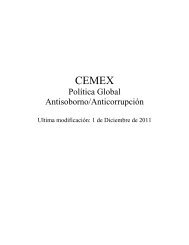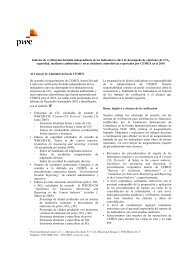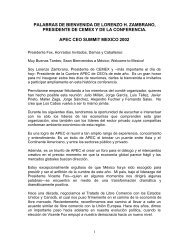building a STRONGER foundation - Cemex
building a STRONGER foundation - Cemex
building a STRONGER foundation - Cemex
You also want an ePaper? Increase the reach of your titles
YUMPU automatically turns print PDFs into web optimized ePapers that Google loves.
The private placement obligations subject to the Financing Agreement bear interest at a rate of 8.91% (except for the private<br />
placement obligations denominated in Japanese Yen, which bear a corresponding rate of 6.625%) per annum. The interest rate on such<br />
private placement obligations is subject to the same adjustment as described above. An interest rate increase due to a failure to meet<br />
amortization targets will cease to apply on the Covenant Reset Date (as defined in the Financing Agreement). There can be no<br />
assurance that we will be able to satisfy the requirements necessary to prevent such pricing increase.<br />
We have a substantial amount of debt maturing in the next several years, including a significant portion of debt not subject to<br />
the Financing Agreement, which could limit our ability to take advantage of investment opportunities. If we are unable to secure<br />
refinancing on favorable terms or at all, we may not be able to comply with our upcoming payment obligations.<br />
As of December 31, 2010, after giving pro forma effect to (1) the issuance of the January 2011 Notes, the 2011 Optional<br />
Convertible Subordinated Notes and the April 2011 Notes, (2) the 2011 Prepayments and (3) the 2011 Private Exchange, we had<br />
approximately Ps208,100 million (U.S.$16,837 million) of total debt, not including approximately U.S.$1,160 million (Ps14,342<br />
million) of Perpetual Debentures, which are not accounted for as debt under MFRS but are considered to be debt for purposes of U.S.<br />
GAAP, but including our debt subject to the Financing Agreement, which was approximately Ps92,271 million (U.S.$7,465 million).<br />
Of such pro forma total debt amount, approximately Ps1,059 million (U.S.$86 million) matures during 2011; approximately Ps4,717<br />
million (U.S.$382 million) matures during 2012; approximately Ps9,283 million (U.S.$751 million) matures during 2013;<br />
approximately Ps99,956 million (U.S.$8,087 million) matures during 2014; and approximately Ps93,085 million (U.S.$7,531 million)<br />
matures after 2014.<br />
Our levels of debt, contractual restrictions, and our need to deleverage may limit our planning flexibility and our ability to react<br />
to changes in our business and the industry, and may place us at a competitive disadvantage compared to competitors who may have<br />
lower leverage ratios and fewer contractual restrictions. There can also be no assurance that, because of our high leverage ratio and<br />
contractual restrictions, we will be able to maintain our operating margins and deliver financial results comparable to the results<br />
obtained in the past under similar economic conditions. Further, if we are unable to comply with our upcoming principal maturities<br />
under our indebtedness (including the Financing Agreement), or refinance our indebtedness, our debt could be accelerated.<br />
Acceleration of our debt would have a material adverse effect on our business and financial condition.<br />
We may not be able to generate sufficient cash to service all of our indebtedness or satisfy our short-term liquidity needs, and<br />
we may be forced to take other actions to satisfy our obligations under our indebtedness and our short-term liquidity needs, which<br />
may not be successful.<br />
Historically, we have addressed our liquidity needs (including funds required to make scheduled principal and interest<br />
payments, refinance debt, and fund working capital and planned capital expenditures) with operating cash flow, borrowings under<br />
credit facilities, receivables and inventory financing facilities, proceeds of debt and equity offerings and proceeds from asset sales.<br />
As of December 31, 2010, we had U.S.$561 million in outstanding short-term working capital and receivables financing<br />
facilities, which consisted of four securitization programs with a combined funded amount of U.S.$539 million and U.S.$22 million<br />
outstanding in short-term CBs. Our accounts receivable securitization program in Spain, which had a funded amount of U.S.$117<br />
million as of December 31, 2010, was extended for five years on May 5, 2011 and now expires on May 5, 2016. On May 19, 2010, we<br />
entered into a one-year accounts receivable securitization program for our U.S. operations for up to U.S.$300 million in funded<br />
amounts. As of December 31, 2010, we had U.S.$231 million in funded amounts under this program. On May 17, 2011, we extended<br />
this program two years for up to U.S.$275 million, and it now expires on May 17, 2013. The scheduled maturity for the securitization<br />
program in France, which had a funded amount of U.S.$57 million as of December 31, 2010, has been extended to September 30,<br />
2011. The securitization program in Mexico, which had a funded amount of U.S.$134 million at December 31, 2010, expires on<br />
December 29, 2011, with the first principal payment (equal to approximately 16.66% of the program) due in August 2011 and the<br />
remainder in five equal monthly installments through the program’s expiration date. We cannot ensure that, going forward, we will be<br />
able to roll over or renew these programs, which could adversely affect our liquidity.<br />
The global equity and credit markets in the last few years have experienced significant price volatility, dislocations and liquidity<br />
disruptions, which have caused market prices of many stocks to fluctuate substantially and the spreads on prospective and outstanding<br />
debt financings to widen considerably. This volatility and illiquidity has materially and adversely affected a broad range of fixed<br />
income securities. As a result, the market for fixed income securities has experienced decreased liquidity, increased price volatility,<br />
credit downgrade events and increased defaults. Global equity markets have also been experiencing heightened volatility and turmoil,<br />
with issuers exposed to the credit markets being most seriously affected. The disruptions in the financial and credit markets may<br />
continue to adversely affect our credit rating and the market value of our common stock, our CPOs and our ADSs. If the current<br />
pressures on credit continue or worsen, and alternative sources of financing continue to be limited, we may be dependent on the<br />
issuance of equity as a source to repay our existing indebtedness, including meeting amortization requirements under the Financing<br />
Agreement. Although we have been able to raise debt, equity and equity linked capital following our entry into the Financing<br />
Agreement in August 2009, as capital markets recovered, previous conditions in the capital markets in 2008 and 2009 were such that<br />
traditional sources of capital were not available to us on reasonable terms or at all. As a result, there is no guarantee that we will be<br />
able to successfully raise additional debt or equity capital at all or on terms that are favorable.<br />
8











